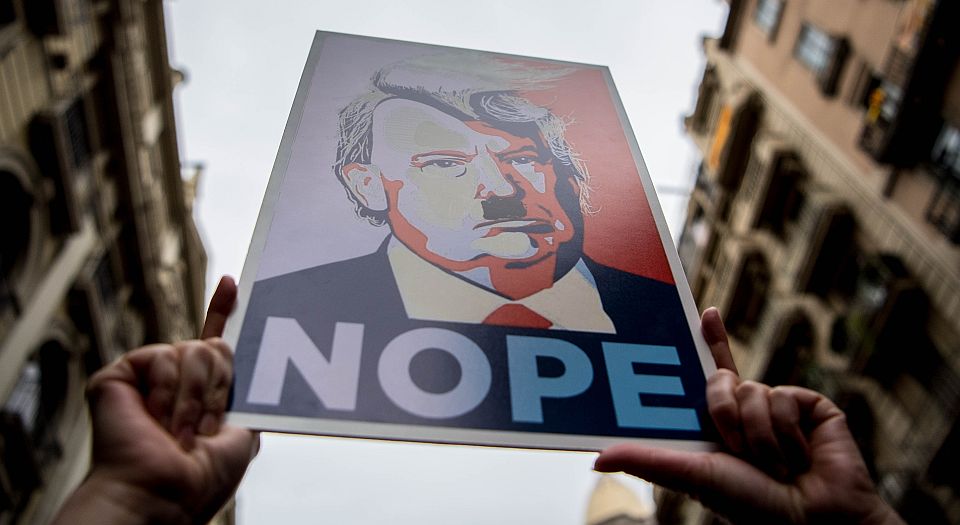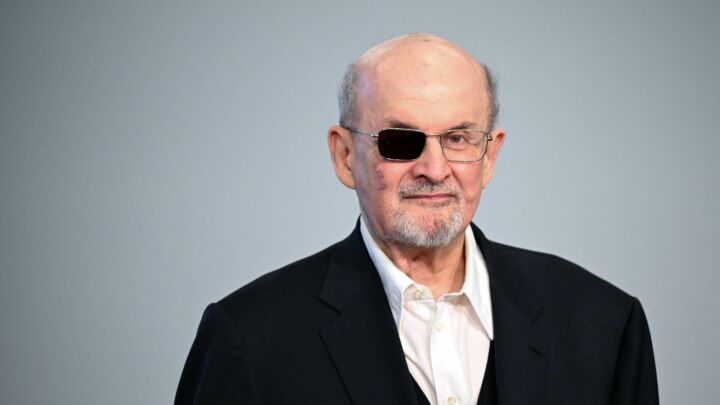‘Just like Hitler’: the diminishing of the Holocaust
Exploiting the Holocaust for political ends is a dangerous game.

That the Western world is experiencing a crisis of political imagination is clear from the casual, everyday allusions to the Holocaust. Across the media, talk of Hitler and genocide and the 1930s is widespread. I’ve stopped counting the number of times I’ve heard people use the phrase ‘he’s like Hitler’ to describe someone they disagree with or fear. Today’s world is just like the 1930s, assert commentators and politicians. And of course the go-to metaphor for evil is the Holocaust. Comparing contemporary events with the period of the Holocaust has become the incantation of every third-rate sophist in search of an argument.
More and more public figures are becoming addicted to using the idiom of Nazism to score a political point. Some expect to have a monopoly over this language and will criticise others who adopt the same rhetorical strategy. Consider UK foreign secretary Boris Johnson. Last May, during the Brexit referendum campaign, he condemned the EU for pursuing the same goal as Hitler: establishing a European superstate. Yet last month he rightly criticised Labour MPs for ‘demeaning the Holocaust’ by comparing President Donald Trump to Hitler.
Listening to the recent parliamentary debate over Trump’s state visit to the UK, one could be forgiven for thinking we were back in September 1938, in the aftermath of Chamberlain’s appeasement of Hitler over the annexation of parts of Czechoslovakia. Veteran Labour MP Dennis Skinner, who has forgotten nothing and learned nothing since entering parliament in 1970, mentioned Hitler and Mussolini in the same breath as Trump before accusing the government of collaborating with the ‘fascist’ Führer in the White House.
Another Labour MP, Mike Gapes, demonstrated his formidable grasp of historiography by portraying Theresa May as a latter-day Chamberlain, before confirming his reputation as a witty parliamentarian by branding her ‘Theresa the appeaser’. And just in case you were still clasping to the belief that we are in 2017, not the 1930s, the Labour MP Nic Dakin provided the killer argument. ‘Holocaust survivors have said this reminds them of the 1930s’, he declared. All that was missing was some eager MP claiming that graffiti of a swastika spotted on a wall somewhere in England reminded him of Kristallnacht.
Some Holocaust-mongers lose all sense of moral perspective when they exploit this catastrophic event for their own political ends. I remember being dumbstruck by the title of an article written by an animal-rights activist: ‘Is it offensive to compare the Holocaust with the meat industry?’ The answer to this rhetorical question, predictably enough, was ‘No’. Why? Because ‘if you go to any meat production house and replace the animals with Jews, that’s exactly what you’ll have: a holocaust’. The casual manner in which Jews can be ‘replaced’ in discussions of the Holocaust shows how far this event has been decontextualised from history, and turned into a transcendental morality play. It seems the fact that Jews were the main target of the Holocaust is purely incidental, so replacing Jews with sheep is considered a legitimate exercise in logic.
If Jews can be replaced with sheep, why not with embryos, too? This is what Mike Huckabee, the former governor of Arkansas, was getting at when he argued that abortion is just like the Holocaust. It seems that, sooner or later, all campaigns feel tempted to exploit the Holocaust brand. Animal-rights activists in Canada refer to a holocaust of seals. In Australia there is talk about of the holocaust against Aborigines. Then there is the African-American holocaust, the Serbian holocaust, the Bosnian holocaust, the Rwandan holocaust.
The label ‘Holocaust’ can be used to attack just about anything these days. Everything from the erosion of biodiversity to the loss of large numbers of jobs can be denounced as a ‘holocaust’. Moral entrepreneurs embrace the Holocaust to lend weight and legitimacy to their campaigns. They also sometimes insist that anyone who questions their worldview should be treated in a similar manner to those who say the Holocaust didn’t happen: that is, as deniers.
The Holocaust has become the most overused metaphor for evil in modern times. In an era when Western societies find it difficult to discuss morality in a real, meaningful way, the Holocaust serves as the functional equivalent of Hell. Even religious figures find it difficult to resist Holocaust-mongering. Pope Francis has not yet issued a papal bull against populism, but he has warned that populism could lead to the election of ‘saviours’ who are similar to Hitler. He also echoed the anti-populist consensus when he said ‘the example of populism in the European sense of the word is Germany in 1933’. Here, the pope didn’t merely compare today with the past and use the phrase ‘like 1933’ – he went a step further and said populism ‘is Germany in 1933’.
Holocaust-mongers seldom explain how or why our world is ‘like the 1930s’ or their figure of hate is ‘like Hitler’. Sometimes they try, but they invariably resort to sophistry rather than making a serious historical comparison. A recent Newsweek article asked: ‘Just how similar is Donald Trump to Adolf Hitler?’ It answered the question by saying ‘what makes the comparison between Hitler and Trump so poignant’ is ‘that both men represent their personal character as the antidote to all social and political problems’. But many politicians do that; they play the saviour card. Focusing on this one personal attribute that Trump and Hitler reportedly share in common is as arbitrary as saying that both of them have problems with their hair.
Holocaust rhetoric relies on reading history backwards. It is an attempt by people to delegitimise their opponents or targets by associating them with the horrors of the past. This strategy is boosted by the fashionable teleological reading of history, which suggests that all the roads of modernity led to Auschwitz. This fatalistic theory of malevolence can be used to indict almost anything that occurred before the Holocaust and treat it as in some sense responsible for the Holocaust. By the same token, treating the Holocaust as the inevitable outcome of otherwise unexceptional things in history that preceded it means that events in the here and now can be held up as precursors of the next Holocaust.
This anachronistic theory of history is most simplistically expressed in the slogan: ‘The Holocaust did not begin with gas chambers – it began with words.’ This slogan is widely used as part of a cautionary tale that draws a link between speech and action, most often between being offensive and creating the conditions for a new Holocaust. So Trump only needs to say something stupid or offensive for people to remind us that ‘the Holocaust began with words’. This inane statement is used to justify shutting down discussion and curbing free speech. The disturbing idea taking hold on American campuses and elsewhere – that free speech leads to hate speech, and even that ‘Free speech is hate speech’ – is the logical consequence of the insidious theory that the Holocaust started with words.
Yet as historians of fascism know, the Holocaust did not begin with words. Fascist movements like the Nazis were not simply a more radical version of right-wing, anti-Semitic nationalists. Unlike classical right-wing nationalist movements, they did not merely rely on words. No, from the outset they deployed violence against their opponents and used physical force rather than argument to beat them into submission. The precondition for the emergence of the Holocaust was the destruction of public life in Germany in the context of a catastrophic global war.
It is something of a paradox that the idea that the Holocaust did not begin in the gas chamber but rather with words is so often used to curb democratic freedoms. And not just by campus censors. When Canada’s public-safety minister, Steven Blaney, introduced a new anti-terrorism bill, he justified his illiberal measures with the mantra: ‘The Holocaust did not begin in the gas chambers. It began with words.’ His plundering of history to score a cheap point, and to undermine liberty, can only contribute to the debasement of our memory of the Holocaust.
Diminishing the Holocaust
Today, when Holocaust talk is everywhere and all sorts of contemporary events are compared to it, it is easy to overlook the fact that it was a neglected part of the Western historical memory for a long time, particularly in the 1950s and 60s. The Holocaust only really emerged as a powerful symbol of human barbarism in the 1980s and 90s. In the 90s, holding back a future Holocaust became one of the defining claims of the EU and its related organisations; they came to denounce anyone who criticised their worldview as a populist echoing the 1930s.
The belated transformation of the Holocaust into a transcendental sacred value in Western Europe was not so much an act of sincere atonement, as an attempt to come to terms with the moral malaise of Western society in the late 20th century. The absence of moral clarity generated conflict over values and created a demand for symbols and rituals that might confer a measure of coherence on the social and political order. When society finds it difficult to say what its values are, or even to differentiate between right and wrong, it is important that some kind of line be drawn between acceptable and unacceptable behaviour. Without a moral grammar through which to express ideas about right and wrong, ethical guidance tends to become more forced and artificial. This is where the Holocaust has come into play: for institutions like the EU, sacralising the Holocaust became an important way of asserting their moral authority
The sacralisation of the Holocaust also provides society with a very powerful taboo. Not being against the Holocaust is probably the most ritualised and institutionalised taboo in Western society today. Back in January 2006, I warned in an article for the Daily Telegraph that the transformation of the Holocaust into a political symbol, and its constant usage in everyday discussion, threatened to deprive it of its important moral meaning. Worse, the more that the terrible experience of the Nazi era has come to be institutionalised through Holocaust days, Holocaust memorials, Holocaust museums, Holocaust curricula and Holocaust films, the more the Holocaust has become a focus of competitive claims-making.
If Holocaust Memorial Day were just another kind of moral ritual, there would be little reason for concern. But such initiatives actually, and unwittingly, help to foster cynicism and scepticism about what happened during the Nazi era. False morality always incites a response of cynicism, and Holocaust-mongering is no exception. In 2004, a poll carried out in nine European countries by the IPSO research institute found that 35 per cent of those surveyed thought Jews should stop playing the role of Holocaust victims. At present, this mood of scepticism is pretty instinctual, and unformed. But it is surely only a matter of time before the obsessive institutionalisation of the cult of the Holocaust creates a situation where scepticism translates into disbelief.
The concerns I raised in 2006 are even more pressing today. Scepticism towards and even denial of the Holocaust have grown significantly – and in parallel with the expansion of public initiatives designed to memorialise the Holocaust. Last month, a report cited Dr Nicholas Terry, a history lecturer at Exeter University, who estimates that there are thousands of ‘low-commitment’ Holocaust deniers online. In December 2016, the top hit on Google in response to the question ‘Did the Holocaust happen?’ was a link to a piece claiming the murder of six million Jews is a hoax. It is inconceivable to think that back in the 1950s or 60s, before the public sacralisation of the Holocaust took off, there would have been such an interest in conspiracy theories claiming this act of genocide didn’t really happen.
Holocaust-mongering is bad enough on its own terms. It cheapens the memory of the Holocaust and it debases political life. Tragically, it also invites scepticism about the Holocaust and encourages the rewriting of history. The more we hear ‘Today is just like the 1930s’, the more Trump or Brexit or other events are spoken about in the same breath as Hitler, the more we lose sight of the true meaning of the singular calamity of the Holocaust.
Frank Furedi is a sociologist and commentator. His latest book, What’s Happened To The University?: A Sociological Exploration of its Infantilisation, is published by Routledge. (buy this book from Amazon(UK)).
Picture by: Getty
To enquire about republishing spiked’s content, a right to reply or to request a correction, please contact the managing editor, Viv Regan.








Comments
Want to join the conversation?
Only spiked supporters and patrons, who donate regularly to us, can comment on our articles.